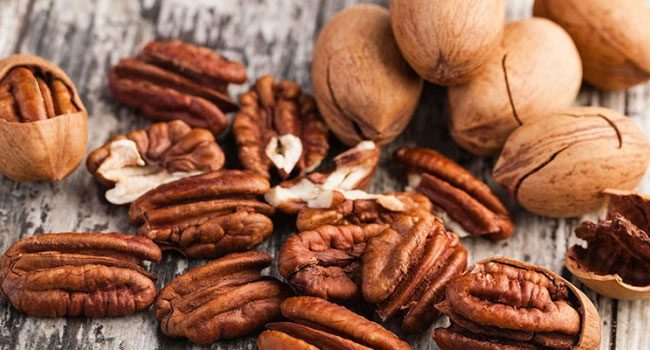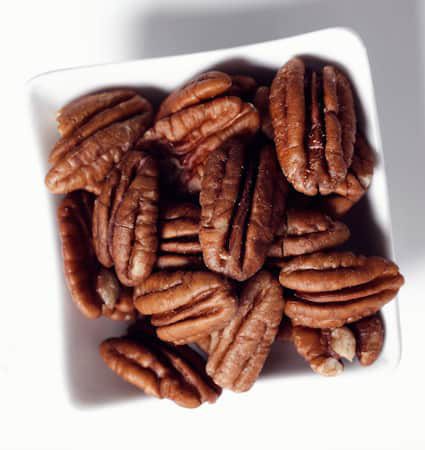Pecan nuts are often confused with walnuts. This type of nut has numerous health benefits.
Benefits of Pecan Nuts
Thanks to their rich, buttery flavor, pecan nuts are widely used in appetizers, desserts, or as a healthy nut-based ingredient in main dishes and beverages. Although pecans are packed with a long list of essential nutrients, their high calorie and fat content often raises questions about their health benefits.
1. Nutritional Value of Pecan Nuts
Pecan nuts are particularly rich in important nutrients, including fiber, thiamine, and zinc. Approximately 28 grams of pecan nuts contain:
- 196 calories
- 2.5 grams of protein
- 20.5 grams of fat
- 4 grams of carbohydrates
- 2.7 grams of fiber
- 38% DV of copper
- 16% DV of thiamine (Vitamin B1)
- 12% DV of zinc
- 8% DV of magnesium
- 6% DV of phosphorus
- 4% DV of iron.
Copper is known as an essential mineral related to nerve cell function, immune system health, and red blood cell production. Meanwhile, thiamine is crucial for converting carbohydrates into energy for the body’s activities. Zinc in pecans is necessary for immune function, cell growth, brain function, and promotes wound healing.

Nutrient-rich pecan nuts are good for health. (Photo: ST).
2. Health Benefits of Pecan Nuts
Here are some health benefits of pecan nuts based on scientific research published on NCBI:
2.1. Preventing Excess Weight Gain
According to Medical News Today, recent research from the NIH indicated that mice fed a high-fat diet including whole pecans or polyphenol extracts from pecans could combat obesity and fatty liver disease compared to mice on a high-fat diet without pecans or pecan extracts.
The study published in the Journal of Nutrition in May 2023 showed that the benefits of adding pecan nuts to the diet of mice enhanced the body’s energy expenditure, thereby aiding in weight control and overall health. Additional benefits included reduced cholesterol, insulin resistance, and inflammation.
Researchers observed a reduction in the size and presence of immune cells in both subcutaneous and visceral fat cells, commonly known to cause inflammation and complications related to obesity.
2.2. Strong Anti-Inflammatory Properties
According to WebMD, pecan nuts contain omega-3 fatty acids that may help reduce inflammation caused by arthritis. When combined with magnesium, calcium, fiber, vitamin E, and zinc, these nuts exhibit strong anti-inflammatory properties.
In a ranking of over 100 foods by antioxidant levels from the USDA, pecans ranked in the top 20. Thanks to their richness in antioxidants and anti-inflammatory compounds, adding pecans to your diet can also enhance the immune system to fight infections and repair existing damage. Folate in pecans is also being studied for its protective effects against changes to DNA, which can lead to cancer.

A serving of pecan nuts provides strong anti-inflammatory and antioxidant properties. (Photo: ST).
2.3. Improving Cardiovascular Health
According to Healthline, pecan nuts are an excellent source of monounsaturated fatty acids beneficial for heart health. Eating 30 grams of pecan nuts daily for 12 weeks improved the ratio of good cholesterol to bad cholesterol in individuals with coronary artery disease.
Another study involving individuals with normal cholesterol levels who supplemented with 68 grams of pecan nuts daily also showed a significant reduction in harmful cholesterol levels after 8 weeks compared to those who did not add any nuts to their diet.
Additionally, pecans are rich in magnesium, calcium, and potassium, which effectively help lower blood pressure. Furthermore, reducing harmful cholesterol levels decreases the risk of stroke or heart attack.
2.4. Stabilizing Blood Sugar Levels
According to Healthline, pecan nuts can promote better blood sugar control due to their high fiber content, which helps slow the absorption of sugar into the bloodstream. This effect is particularly beneficial for individuals with diabetes, as well as those who are overweight or obese, to improve the body’s insulin sensitivity.
Research has shown that nuts can help prevent heart disease in people with diabetes. Snacking on nuts when hungry can help you feel full, making it easier to avoid carbohydrate-rich foods and control blood sugar levels.
Moreover, this diet also helps improve the function of beta cells in the pancreas, which are responsible for insulin production.
Additionally, pecan nuts have a very low glycemic index, meaning that eating them does not raise blood sugar levels, even in people with diabetes. Consuming pecans can even offset the effects of higher glycemic index foods when eaten as part of the same meal.
2.5. Enhancing Brain Function
Pecan nuts contain many nutrients that contribute to improving brain function, including in older adults experiencing cognitive decline, such as monounsaturated and polyunsaturated fatty acids.
Specifically, monounsaturated fatty acids are associated with reduced rates of mental decline and reduced inflammation in the body. However, research on this function is still limited regarding the direct impact of pecans on brain function.

Avoid eating pecan nuts if you have a history of nut allergies.
3. Potential Drawbacks
Although pecan nuts are associated with several potential health benefits, there are some issues to consider:
- Avoid eating pecan nuts if you have a history of allergies to nuts, such as almonds, cashews, chestnuts, and walnuts.
- The calorie content of 28 grams of pecan nuts is nearly 200 calories – relatively high, so consuming multiple servings can increase your daily calorie intake. You should try to manage calorie intake by adjusting your diet or increasing physical activity when adding pecan nuts to your daily diet.
4. Distinguishing Between Walnuts and Pecan Nuts
Pecan nuts and walnuts both belong to the nut family but are two different types. You can distinguish them based on their shape and flavor:
– Shape: The two types of nuts are relatively similar in shape, both having ridges, but differ in color:
- Walnuts are light yellow (creamy yellow).
- Pecan nuts are yellow or dark brown.
– Flavor:
- Walnuts have a bitter taste at the tip of the tongue.
- Pecan nuts have a sweeter flavor.
Overall, pecan nuts are a healthy nut but should be consumed in moderation, with a maximum daily serving of about 28 grams to avoid excessive fiber intake that may upset the digestive system. If you have concerns about allergies or health conditions, you should consult a doctor for appropriate advice.


















































